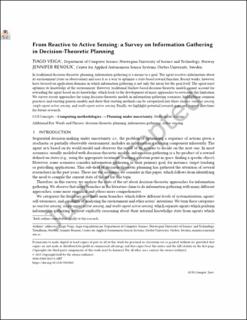| dc.description.abstract | In traditional decision-theoretic planning, information gathering is a means to a goal. The agent receives information about its environment (state or observation) and uses it as a way to optimize a state-based reward function. Recent works, however, have focused on application domains in which information gathering is not only the mean but the goal itself. The agent must optimize its knowledge of the environment. However, traditional Markov-based decision-theoretic models cannot account for rewarding the agent based on its knowledge, which leads to the development of many approaches to overcome this limitation. We survey recent approaches for using decision-theoretic models in information-gathering scenarios, highlighting common practices and existing generic models and show that existing methods can be categorized into three classes: reactive sensing, single-agent active sensing, and multi-agent active sensing. Finally, we highlight potential research gaps and suggest directions for future research. | en_US |
